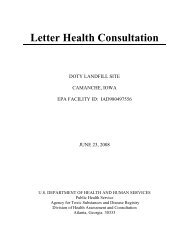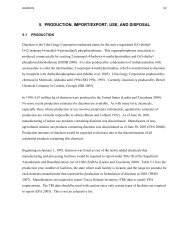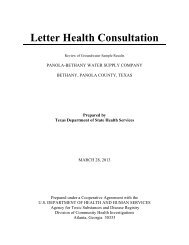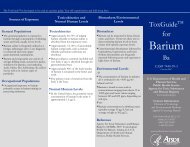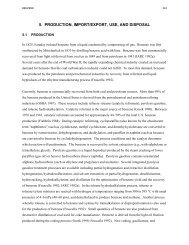Principles of Community Engagement (Second Edition)
Principles of Community Engagement (Second Edition)
Principles of Community Engagement (Second Edition)
Create successful ePaper yourself
Turn your PDF publications into a flip-book with our unique Google optimized e-Paper software.
• Coalitions require that each party believe it needs help to reach its goals.<br />
• The goals and perspectives <strong>of</strong> the members <strong>of</strong> a coalition will not all be<br />
shared However, the coalition requires sufficient common ground that the<br />
parties can agree over time on a purpose, set <strong>of</strong> policies, and strategies<br />
• Coalitions require continuous and <strong>of</strong>ten delicate negotiation among their<br />
participants<br />
• The distribution <strong>of</strong> power and benefits among the members <strong>of</strong> a coalition<br />
is an ongoing concern; all members need to believe that, over time, they<br />
are receiving benefits that are comparable to their contributions (S<strong>of</strong>aer,<br />
1993)<br />
Coalitions can help the engagement process in a number <strong>of</strong> ways, including<br />
maximizing the influence <strong>of</strong> individuals and organizations, creating new collective<br />
resources, and reducing the duplication <strong>of</strong> efforts The effectiveness <strong>of</strong><br />
coalitions has been evaluated on two distinct bases: how well the members<br />
work together, and what kinds <strong>of</strong> community-level changes they bring about<br />
While noting that the research literature is inadequate for determining which<br />
factors are associated with the effectiveness <strong>of</strong> coalitions, Zakocs et al (2006)<br />
suggest six possibilities: formalization <strong>of</strong> rules/procedures, leadership style,<br />
participation <strong>of</strong> members, diversity <strong>of</strong> membership, collaboration, and group<br />
cohesion<br />
Based on their review <strong>of</strong> the literature on coalitions, Butterfoss et al (2002)<br />
developed community coalition action theory, which provides 23 practice-based<br />
propositions that address processes ranging from the formation <strong>of</strong> coalitions<br />
through the institutionalization <strong>of</strong> long-lasting coalitions These propositions,<br />
which shed light on how to create and support effective long-term alliances,<br />
will be discussed in greater detail in Chapter 4<br />
THE ETHICS OF COMMUNITY ENGAGED RESEARCH<br />
Debates about the ethics <strong>of</strong> clinical research are not new (Chen et al , 2006;<br />
Emanuel et al , 2000; Levine, 1988), but community-engaged research (CEnR)<br />
17




